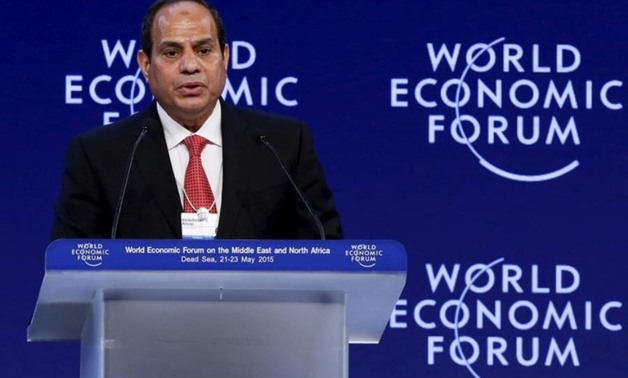
Egyptian President Abdel Fattah al-Sisi addresses the World Economic Forum in Jordan. (photo credit: REUTERS)
CAIRO – 2 June 2018: Egypt’s President Abdel Fatah al-Sisi took the oath of his second four-year presidential term Saturday before the House of Representatives. He is deemed the first to take the oath after the January revolution in 2011.
In 2005, former President Hosni Mubarak swore in before the Parliament as the republic’s fourth president, following the first free pluralist election in the country.
Thirteen years later, Sisi revives the swearing-in ceremony before the parliament, as he had taken his first term’s oath in 2014 before the General Assembly of the Supreme Constitutional Court due to the absence of the Parliament at that time.
“I swear by God Almighty to loyally uphold the republican system, to respect the Constitution and the law, to fully uphold the interests of the people and to safeguard the independence and territorial integrity of the nation,” Sisi pledged Saturday.
On June 3, the second presidential term officially begins, following taking the oath in an unexceptional parliamentary session chaired by Speaker Ali Abdel Aal.
Sisi’s priorities in the second term differ from the first ones. He stressed that great focus will be given to “build the Egyptian man physically, culturally and educationally.
In the first four years (2014-2018), Sisi focused on boosting the country’s foreign policy by forming political and economic partnerships with major regional and world powers.
Sisi flew to dozens of countries, where he held high-level meetings with political leaders and participated in international forums with the aim to deliver the new image of Egypt to the world.
The president’s tours basically sought to attract foreign investment to the country, which is currently undergoing intensive economic reform measures with the aim to adjust the business climate for local and foreign companies.
As an African country, Sisi gave great attention to boost Egypt’s bonds with African neighbors amid current disputes over the Ethiopian Great Renaissance Dam (GERD). Sisi made a historic visit to Ethiopia in January 2017, as he took part in the 28th African Union (AU) Summit held in the Ethiopian capital Addis Ababa.
One month later, he paid a visit to Kenya and tackled ways to boost economic relations between the two countries, particularly in light of their membership in the Common Market for Eastern and Southern Africa (COMESA).
Sisi’s trips to the United States were significant because he met with his American counterpart President Donald Trump and dozens of U.S. officials, congressmen and businessmen.
"You have a great friend and ally in the United States - and in me," Trump told Sisi, the first Egyptian president to visit the White House in almost a decade in April 2017.
President Sisi participated in the ninth BRICS summit held in China in last September in the framework of his keenness to formulate partnerships with the world’s fastest-growing emerging markets. Addressing the BRICS bloc (Brazil, Russia, India, China, and South Africa), Sisi briefed member countries on the current Egyptian economic reform program and the bold measures taken recently by the Egyptian government to encourage investment.
 President Sisi, Egyptian first lady (L) along with Chinese Presidents and his wife (R) pose for a picture at 9th BRICS Summit in China's Xiamen_press photo.jpg
President Sisi, Egyptian first lady (L) along with Chinese Presidents and his wife (R) pose for a picture at 9th BRICS Summit in China's Xiamen_press photo.jpg
Speaking about the Belt and Road Initiative, Sisi said Egypt's unique geographical position allows it to be a major transit point between the east and the west, and from the south to the north through the Suez Canal, which is currently prepared to host leading economic and industrial zones linking the world.
Egypt has been trying to rely less heavily on the United States for support, which prompted Sisi to search for stronger ties with China. Egypt can be China's gate to international markets through a number of trade agreements, including the Common Market for Eastern and Southern Africa, the EU-Egypt Association Agreement and the Free Trade Agreement with the EFTA and MERCOSUR and the Qualifying Industrial Zones (QIZ), which allow Egypt exports to reach about 1.8 billion people worldwide.
Unlike former presidents, Sisi is only counting on one global power. He relies more on the partnership and mutual interests between Egypt and other countries. Therefore,
Egypt Today briefs you with some photos showing Sisi’s visits to foreign countries across the world; Asian, European, African and American.
 Abdel_Fatah_Al-Sisi_(L),_King_Salman_(C)_and_Donald_Trump_(R)_in_Riyadh.
Abdel_Fatah_Al-Sisi_(L),_King_Salman_(C)_and_Donald_Trump_(R)_in_Riyadh.
 President_Abdel_Fatah_Al-Sisi_(L)_and__Tanzanian_President_John_Magufuli_(R)- Press Photo
President_Abdel_Fatah_Al-Sisi_(L)_and__Tanzanian_President_John_Magufuli_(R)- Press Photo
 Egyptian President Abdel Fattah El-Sisi (R) and Germany's Chancellor Angela Merkel (L) in Berlin (Photo Reuters).
Egyptian President Abdel Fattah El-Sisi (R) and Germany's Chancellor Angela Merkel (L) in Berlin (Photo Reuters).





Comments
Leave a Comment